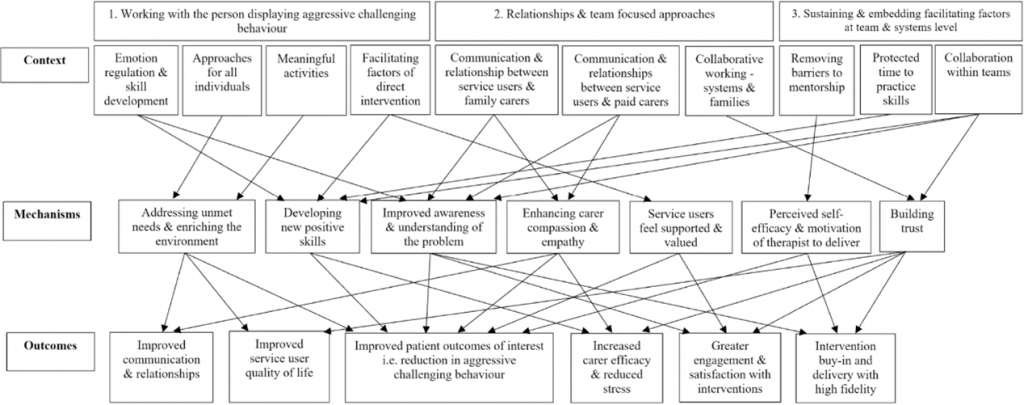
Aggressive difficult behaviour contains verbal aggression, bodily violence, sexual aggression, self-injurious behaviour and property injury. These behaviours in individuals with mental incapacity are a comparatively frequent prevalence and are recognized to impression high quality of life, improve financial prices and infrequently lead to exclusion from actions (Richings et al., 2011; Sheehan et al., 2015).
Regardless of it being a generally occurring concern, practitioners have but to determine on a constant, implementable strategy to managing difficult behaviours attributable to mental incapacity or cognitive impairment similar to verbally or bodily threatening behaviour (Van Den Bogaard et al., 2018).
Traditionally, psychotropic medicine has been used as the principle intervention, nevertheless, this has a comparatively poor proof base and is thought to trigger a excessive burden of unwanted effects. Many adults with mental incapacity are prescribed antipsychotic medicine with none recognized psychological sickness (Sheehan et al., 2015). Psychological interventions, for instance Constructive Behavioural Assist have proven promising outcomes, nevertheless, there’s a paucity of high-quality supporting information (Hassiotis et al., 2018; Gore et al., 2013). This paper makes an attempt to systematically dig deeper into present interventions while acknowledging the numerous complexity concerned.

Difficult behaviour in adults with mental incapacity is frequent but we do not need a constant strategy to interventions past medicine.
Strategies
The authors used a realist assessment strategy, which addresses ‘what works, for whom, below what circumstances and the way’ (Wong et al., 2016). The method entails creating a scope and preliminary principle, conducting a literature search, extraction and evaluation of the findings earlier than creating a closing programme principle. The RAMESES-II requirements for evaluation and reporting have been used to information the method (Wong et al., 2016). The iterative strategy implies that the authors repeatedly reviewed the findings with the intention of enhancing them. An knowledgeable panel of 9 stakeholders have been concerned throughout the course of to ‘make sure the outcomes have been related to the scientific context of this inhabitants’ (p.3). The inclusion standards have been broad and included findings from different inhabitants teams, for instance dementia, adults with psychological sickness and younger individuals with conduct issues, throughout a variety of settings. Within the later levels of the assessment, the authors additionally thematically analysed six stakeholder interviews from healthcare professionals, carers and repair managers to check and validate the rising theories.
Outcomes
The outcomes provide an in depth look into the effectiveness of a variety of interventions. 59 research have been included within the assessment, 37 of which focussed on people with mental incapacity, 10 on neurotypical people with psychological sickness, eight on individuals dwelling with dementia, two with behavioural problems, and two on people with autism spectrum dysfunction. Six of the research included simply kids or adolescents. Most research have been from the UK (n=30), and most used an experimental design (n=30). A complete of 34 papers have been judged to be each ‘extremely related and rigorous’.
From the information analysed, three major areas of intervention have been recognized as having important impacts: Direct interventions (working with the particular person displaying aggressive difficult behaviour), relationship dynamics (relationships, and workforce centered approaches), and system-level interventions (embedding and sustaining facilitating elements at workforce and programs ranges).
1. Direct interventions
Interventions specializing in emotion regulation and talent growth confirmed constructive outcomes. For people with delicate to reasonable mental disabilities, packages that included coaching in recognising emotional triggers and managing responses have been notably efficient. Coaching for sensory stimulation was proposed to lead to a calmer setting and a discount in aggressive difficult behaviour. Engagement in significant actions and personalising interventions have been recognized as beneficial methods. The period of intervention diverse throughout research, with a suggestion that longer remedy durations could also be useful for these with impaired cognitive potential. The pattern sizes within the research diverse, with some together with as few as 20 individuals, whereas bigger research included as much as a number of hundred.
2. Relationship dynamics
The outcomes underscored the significance of communication and relationship-building between caregivers, paid workers and people with aggressive difficult behaviour. Interventions that included coaching for caregivers on the way to talk extra successfully and handle stress improved the general setting and decreased situations of aggressive behaviour. Themes of respect, non-judgemental follow and collaboration with the particular person are proposed as enhancing outcomes.
3. System-level interventions
Modifications on the organisational stage, similar to implementing coaching packages and creating roles for intervention champions confirmed promise in sustaining the advantages of direct and relational interventions over time. Protected time to follow and be taught abilities, and cohesive working with shared duty have been recognized as potential useful interventions to maintain and embed change at workforce and programs ranges.
The ultimate programme pathway incorporates all of the theories and contains talent constructing, addressing unmet wants, enhancing understanding of aggressive difficult behaviour, and enhancing motivation, talent and understanding of carers. The pathway suggests the outcomes might be improved communication and relationships, improved service person high quality of life, discount in aggressive difficult behaviour, elevated carer efficacy and decreased stress, higher engagement and satisfaction with interventions and intervention buy-in and supply with excessive constancy.

Three major areas of intervention have been recognized as having important impacts on difficult behaviour in adults with mental incapacity: Direct interventions, relationship dynamics, and system-level interventions. [View full-sized image]
Conclusions
- The assessment concludes that efficient administration of aggressive behaviour in adults with mental disabilities requires personalised interventions, strong caregiver relationships, and sustained system-level help.
- Key findings spotlight the necessity for interventions tailor-made to particular person emotional and cognitive capabilities and underscore the significance of enhancing caregiver communication and relational abilities.
- System-wide modifications, similar to ongoing coaching and help for workers, are essential for sustaining the advantages of those interventions.
- The authors famous, “Interventions have to be adaptive to particular person wants and supported by an setting that fosters constant and knowledgeable caregiver practices to see a significant discount in aggressive behaviour.“
- This complete strategy appears to be important for long-term success in managing difficult behaviours.

A complete, personalised strategy is essential to success in managing difficult behaviours in adults with mental incapacity
Strengths and limitations
The assessment presents a sturdy methodology, leveraging a fast realist assessment strategy guided by RAMESES-II requirements, which strengthens the reliability of the conclusions drawn. The pragmatic strategy is described as frequent in realist opinions, and could also be useful to broaden findings, however might impression the implications for scientific follow, when in comparison with different systematic approaches similar to meta-analysis.
Whereas the assessment was complete, the choice to incorporate research from totally different settings and ranging populations might have an effect on the generalisability of the findings. There’s a paucity of research out there utilizing experimental methodology in adults with mental incapacity which the authors acknowledge, and due to this fact broadening the inclusion standards is affordable and in some ways a energy of the examine. Nonetheless, it stays necessary to do not forget that individuals with mental incapacity typically have totally different experiences to different people with aggressive difficult behaviour. An older particular person with aggressive behaviour in dementia might not reply to the identical interventions as a younger grownup with Prader-Willi syndrome for instance.
As is usually the case with opinions, there’s a lack of standardisation in how interventions have been carried out and measured. This complicates the authors’ capability to attract agency conclusions in regards to the worth of sure approaches. Given the advanced nature of behavioural interventions and the subjective measures typically used to evaluate outcomes, there’s a threat of observer bias. The reliance on self-reported information or assessments by people near the intervention may affect the reported effectiveness.

The assessment contains analysis from a broad vary of people with aggressive difficult behaviour.
Implications for follow
From the angle of a psychiatrist specialising in mental incapacity, the findings of this assessment resonate deeply with my scientific experiences. Typically, I discover myself in conditions the place medicine turns into a main intervention for managing aggressive behaviours because of the lack of available and strong psychological intervention packages. This reliance on pharmacological options, whereas generally obligatory, will not be all the time preferrred, particularly contemplating the potential unwanted effects and the variability in particular person responses to medicines. Well being and social care programs are sometimes fragmented with practitioners in every camp strongly advocating for the opposite to choose up the slack. My expertise is that this leads to the adoption of threat mitigation interventions similar to restrictive practices, hospitalisation, or medicine, and will increase the unmet wants for the person, which additional contribute to deterioration in behaviours. Psychosocial interventions (e.g. constructive behaviour help) are gaining traction as a substitute for restrictive practices and psychotropic use, nevertheless, we nonetheless lack a robust proof base for his or her use (Hassiotis et al., 2018).
The authors draw on a broad vary of analysis to generate their programme principle pathway. That is inherently helpful to information the following steps for analysis. In addition they neatly summarise the advantages of approaches presently getting used. Nonetheless, they don’t inform me what I ought to not be doing, nor do they supply compelling experimental proof of any explicit intervention right here. Regardless of this, the paper provides weight to the pragmatic approaches that emphasise individualised care, engagement of these across the particular person and the necessity for systemic change. Future research ought to intention to standardise intervention protocols and consequence measures to offer clearer, extra actionable information. Analysis into the long-term results of those interventions, in addition to their cost-effectiveness, would even be beneficial for shaping future care methods.
Policymakers ought to recognise the necessity for funding and assets to help the continuing coaching and growth of workers. This assessment highlights the significance of systemic help to make sure that interventions should not solely launched however maintained successfully over time. Insurance policies ought to facilitate common assessment and adaptation of care practices to maintain them related and efficient, incorporating the most recent analysis findings.
All stakeholders will profit from a extra subtle strategy to difficult behaviour. Analysis and ensuing interventions ought to replicate this complexity and this paper is a crucial and sensible contribution in the correct path.

What ought to clinicians not be doing in relation to coping with difficult behaviour in adults with mental disabilities?
Assertion of pursuits
I’m an mental incapacity psychiatrist in New South Wales, Australia. I’ve authored analysis on difficult behaviour in individuals with mental incapacity, co-authors have included members of the analysis workforce concerned on this paper (AH, AS), (Smith, J. et al. 2022)
Hyperlinks
Main paper
Royston, R., Naughton, S., Hassiotis, A., Jahoda, A., Ali, A., Chauhan, U., … & Rapaport, P. (2023). Complicated interventions for aggressive difficult behaviour in adults with mental incapacity: A fast realist assessment knowledgeable by a number of populations. PLoS one, 18(5), e0285590.
Different references
Gore, N. J., McGill, P., Toogood, S., Allen, D., Hughes, J. C., Baker, P., … & Denne, L. D. (2013). Definition and scope for constructive behavioural help. Worldwide Journal of Constructive Behavioural Assist, 3(2), 14-23.
Hassiotis, A., Poppe, M., Strydom, A., Vickerstaff, V., Corridor, I. S., Crabtree, J., … & Crawford, M. J. (2018). Scientific outcomes of workers coaching in constructive behaviour help to scale back difficult behaviour in adults with mental incapacity: cluster randomised managed trial. The British Journal of Psychiatry, 212(3), 161-168.
Richings, C., Prepare dinner, R., & Roy, A. (2011). Service analysis of an built-in evaluation and remedy service for individuals with mental incapacity with behavioural and psychological well being issues. Journal of Mental Disabilities, 15(1), 7-19.
Sheehan, R., Hassiotis, A., Walters, Okay., Osborn, D., Strydom, A., & Horsfall, L. (2015). Psychological sickness, difficult behaviour, and psychotropic drug prescribing in individuals with mental incapacity: UK inhabitants primarily based cohort examine. Bmj, 351.
Sheehan, R., Mutch, J., Marston, L., Osborn, D., & Hassiotis, A. (2021). Threat elements for in-patient admission amongst adults with mental incapacity and autism: investigation of digital scientific information. BJPsych Open, 7(1), e5.
Smith, J., Baksh, R. A., Hassiotis, A., Sheehan, R., Ke, C., Wong, T. L. B., … & PETAL Investigators. (2022). Aggressive difficult habits in adults with mental incapacity: An digital register-based cohort examine of scientific consequence and repair use. European Psychiatry, 65(1), e74.
van den Bogaard, Okay. J., Nijman, H. L., Palmstierna, T., & Embregts, P. J. (2018). Traits of aggressive habits in individuals with delicate to borderline mental incapacity and co-occurring psychopathology. Journal of Psychological Well being Analysis in Mental Disabilities, 11(2), 124-142.
Wong, G., Westhorp, G., Manzano, A., Greenhalgh, J., Jagosh, J., & Greenhalgh, T. (2016). RAMESES II reporting requirements for realist evaluations. BMC medication, 14, 1-18.


